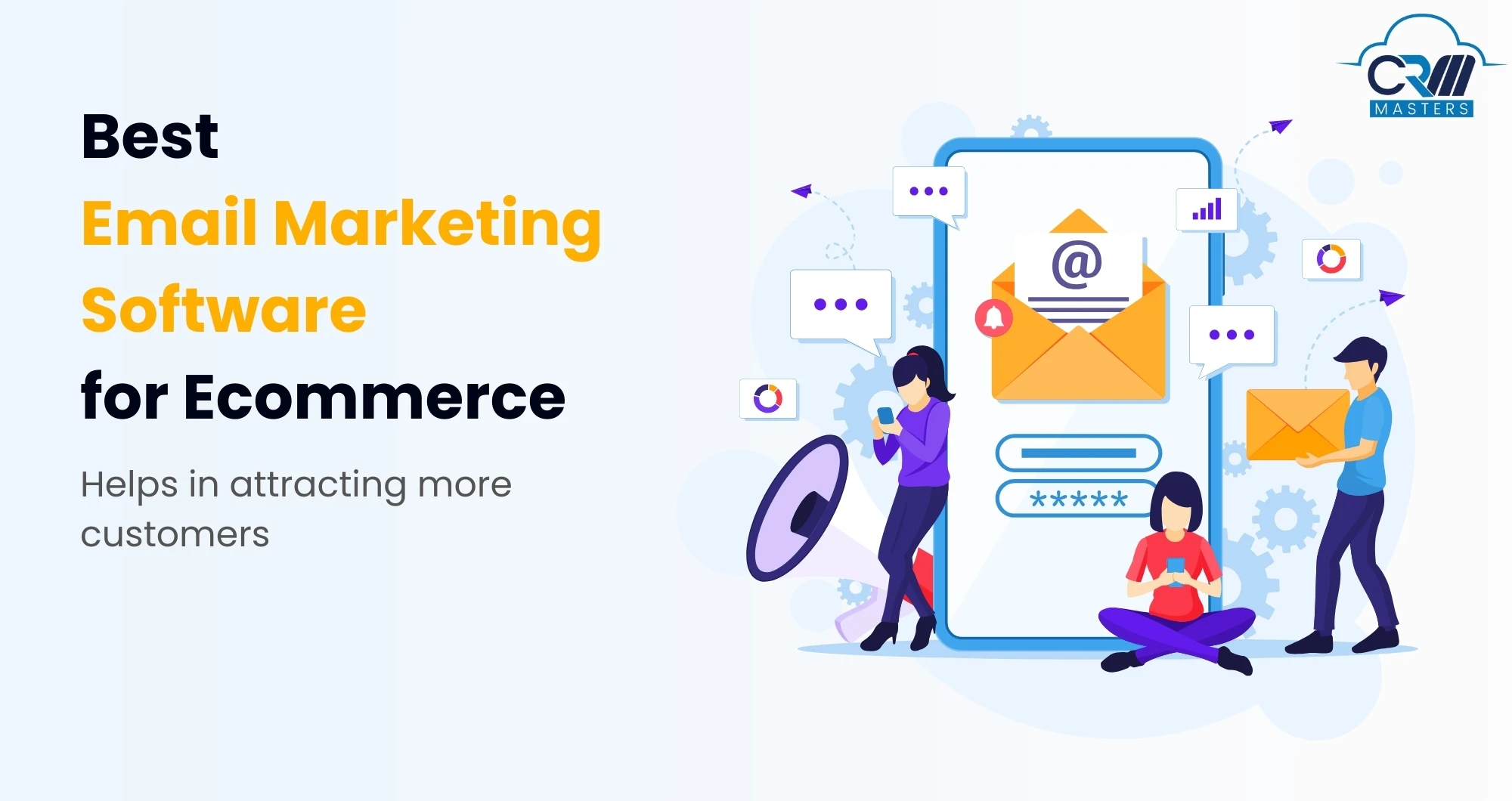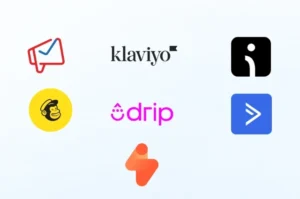
Best Email Marketing Software for Ecommerce in 2025 (Features, Tools & Strategies)
Running an ecommerce business is exciting, but also challenging. With so many competitors online, the biggest question every store owner faces is: How do I get more customers? One of the most reliable ways to reach new people, nurture them, and convert them into loyal buyers is through email marketing. Unlike social media, where algorithms change constantly, emails land directly in your customer’s inbox, giving you a more personal and lasting connection. This is where Email Marketing Software for Ecommerce comes in. These tools make the process easier, more organized, and more effective, helping online businesses generate qualified leads and drive sales. And when paired with expert Zoho Consulting Services, ecommerce brands can get customised strategies that align marketing and CRM for maximum ROI.
In this blog, we’ll explore how email marketing software works for ecommerce, its important features, and how it helps you turn clicks into customers.
What is Email Marketing Software for Ecommerce?

Email Marketing Software for Ecommerce works as your digital marketing assistant, handling repetitive tasks, keeping your audience engaged, and ensuring no lead slips away.
For example, platforms like Zoho Campaigns provide ecommerce stores with features like subscriber management, ready-made email templates, automation workflows, and integration with ecommerce tools and CRMs.
Email marketing software for ecommerce is a tool that helps you:
- Collect and manage customer emails
- Send personalized campaigns
- Automate follow-ups
- Track performance with analytics
Studies show that email marketing can deliver an ROI of $36 for every $1 spent, making it one of the most profitable marketing channels for ecommerce.
But managing everything manually can be overwhelming. That’s where dedicated email marketing software steps in.
Let’s understand why email marketing is so powerful for online stores:
- Emails go straight to the inbox, not lost in a feed.
- You can send tailored offers to each customer based on their interests.
- Compared to ads, emails require less investment but give higher returns.
- Every open, click, and purchase is tracked, helping you improve strategies.
Key Features to Look for in Ecommerce Email Marketing Software
Let’s break down the different ways tools like Zoho Campaign, & more actually help in generating leads:
1. Building and Growing Your Contact List
The first step to lead generation is collecting emails. This way, you don’t just get random email addresses; you get quality leads who are already interested in your products.
Email Marketing Software makes this process easy by:
- Allowing you to import contacts from multiple sources (like your website, CRM, or even in-store purchases).
- Offering signup forms and pop-ups for your ecommerce site.
- Integrating with platforms like Shopify, WooCommerce, or Zoho CRM to automatically capture leads.
2. Personalized Campaigns That Grab Attention
This level of personalization increases open rates and encourages customers to take action. In ecommerce, a single targeted email can often lead to a direct purchase. Once you have a list, the real magic begins.
With email marketing software, you can:
- Segment your audience (e.g., first-time visitors, repeat customers, abandoned cart users).
- Send personalized messages (like “We saved your cart” or “Recommended for you”).
- Use dynamic content that changes based on customer behavior.
3. Automation That Saves Time and Boosts Results
This ensures your ecommerce brand stays connected with customers 24/7, without extra effort from your side. Manual emails are time-consuming. Automation changes the game.
With automation workflows, you can:
- Send a welcome email when someone subscribes.
- Follow up automatically if they don’t purchase.
- Offer discount codes to re-engage inactive customers.
- Send “thank you” emails after a purchase.
4. A/B Testing for Better Conversions
Not sure which subject line or design will work better?
Email marketing software offers A/B testing, letting you test two versions of an email and see which one performs better. The software will track opens and clicks, then automatically send the better-performing email to the rest of your list. This directly improves lead conversions.
For example:
- Subject line A: “Your cart is waiting!”
- Subject line B: “Hurry! Items in your cart may sell out.”
5. Tracking and Analytics
Every click tells a story. This data helps ecommerce owners understand what’s working and what needs improvement, making future campaigns even stronger.
Email marketing tools come with detailed analytics so you can measure:
- Open rates
- Click-through rates
- Conversions
- Revenue generated
6. Integration With CRM and Ecommerce Platforms
Another major benefit is integration. This integration ensures all customer data flows smoothly, giving you a 360° view of your buyers. When your sales team knows where each lead is in the funnel, it’s easier to close deals.
Most email marketing software connects with tools like:
- Zoho CRM
- Shopify
- WooCommerce
- Salesforce
- HubSpot
Also Read: Zoho Campaign Easy Setup Guide
Proven Strategies for Ecommerce Email Marketing Success
Having email marketing software is only useful if you know how to make the most of it. The key is to use it not just for promotions, but for building real relationships with your customers.
Here are some effective strategies:
1. Create a Strong Welcome Series
First impressions matter. When someone signs up for your newsletter or creates an account, don’t just send a plain “thank you.” Instead, build a small series of 2–3 automated emails:
- Email 1: A warm welcome with a short brand story.
- Email 2: Showcase bestsellers or trending products.
- Email 3: Offer a discount code or free shipping to encourage the first purchase.
2. Recover Lost Sales with Abandoned Cart Emails
Did you know that a large number of online shoppers abandon their carts? That’s a lot of lost sales, but email marketing software can help you recover them.
Set up an automated reminder that triggers when a cart is left behind. For even better results:
- Send the first reminder within 1–2 hours.
- Add product images to remind them what they left behind.
- Offer a small incentive, like 10% off or free shipping.
3. Send Personalized Product Recommendations
Personalization is where email marketing shines. Instead of sending generic offers, suggest products based on browsing history or past purchases.
For example, if a customer bought a smartphone, you could recommend covers, headphones, or screen protectors. This not only increases sales but also shows that you understand customer needs.
4. Run Seasonal and Holiday Campaigns
Festive seasons are when shoppers spend the most. Schedule these campaigns in advance, design attractive templates, and create urgency with countdown timers or limited-time discounts.
Use your software to plan campaigns around:
- Black Friday
- Christmas & New Year
- Valentine’s Day
- Diwali or other regional festivals
5. Re-engage Inactive Customers
Not every customer will shop frequently, but that doesn’t mean they’re lost forever. A well-crafted re-engagement campaign can bring them back. For example, a beauty brand might send an email like, “It’s been a while since your last order, here’s 15% off your favorite products.”
Ideas include:
- “We miss you” emails with special discounts.
- Updates about new products they might like.
- Loyalty program reminders.
6. Build Loyalty with Exclusive Offers
Repeat customers are the backbone of ecommerce. This makes them feel valued and increases their lifetime value.
Reward them with:
- Early access to discounted sales
- Birthday or anniversary discounts
- Special rewards for hitting a spending milestone
7. Use A/B Testing to Improve Results
Small changes in emails can make a big difference. Most software allows A/B testing, where you can test two versions of an email. Over time, this helps you understand what your audience responds to best.
Try experimenting with:
- Subject lines (e.g., “Your cart is waiting” vs. “Don’t miss out on your picks”)
- Call-to-action buttons (e.g., “Shop Now” vs. “Grab Yours Today”)
- Images or layouts
The 7 Best Email Marketing Software for Ecommerce in 2025

Here’s a breakdown of the leading tools for ecommerce brands in 2025:
1. Zoho Campaigns (Our Top Pick for SMBs & Zoho Users)
Best for: Businesses already using Zoho CRM or Zoho One.
Features: Advanced automation, ecommerce workflows, A/B testing, analytics.
Integrations: Seamless with Zoho CRM, Shopify, WooCommerce.
Why choose: Affordable, powerful, and perfect if you want full CRM + marketing alignment.
2. Klaviyo
Best for: Shopify & DTC brands.
Features: Advanced segmentation, predictive analytics, cart recovery.
Why choose: A favorite among Shopify merchants for ecommerce-specific automation.
3. Omnisend
Best for: Multichannel campaigns (email, SMS, push).
Features: Ready-to-use ecommerce templates, automation, A/B testing.
Why choose: Great for brands that want email + SMS under one platform.
4. Mailchimp
Best for: Beginners & small stores.
Features: Easy drag-and-drop editor, templates, audience insights.
Why choose: User-friendly and widely adopted.
5. ActiveCampaign
Best for: Businesses needing advanced automation & CRM features.
Features: Predictive sending, split automations, deep segmentation.
Why choose: Ideal for ecommerce stores scaling to enterprise-level marketing.
6. Drip
Best for: Ecommerce-focused brands.
Features: Personalization, customer journey maps, ecommerce revenue tracking.
Why choose: Built specifically for ecommerce growth.
7. HubSpot Marketing Hub
Best for: Large enterprises needing an all-in-one platform.
Features: Advanced CRM, automation, sales + service hub.
Why choose: Best for companies that want everything (CRM + marketing) in one place.
Also Read: How Drip Marketing Email Campaigns Work: Everything From Leads to Sales
Ready to Grow Your Ecommerce Store with Smarter Email Marketing?
Email remains the highest ROI marketing channel for ecommerce, and the right software makes all the difference.
At CRM Masters, we are a Zoho Implementation Partner with 9+ years of experience helping ecommerce businesses scale with Zoho Solutions. From consulting and strategy to complete setup and automation, we ensure your email campaigns don’t just reach inboxes, they convert.
Book a Free Consultation Call today and let’s grow your ecommerce store with smarter, data-driven email marketing.
FAQs
Q1. What is the best email marketing software for ecommerce?
Ans. Zoho Campaigns, Klaviyo, and Omnisend are leading choices depending on budget, integrations, and automation needs.
Q2. Which email marketing tool is best for Shopify stores?
Ans. Klaviyo is the most popular, while Omnisend is excellent for Shopify merchants who want email + SMS together.
Q3. Is Zoho Campaigns good for ecommerce?
Ans. Yes, especially if you already use Zoho CRM or Zoho One. It’s affordable and integrates seamlessly with Shopify and WooCommerce.
Q4. Free vs. Paid tools — which should I choose?
Ans. Free plans (like Mailchimp’s or Omnisend’s) are fine for small stores, but scaling ecommerce businesses need paid plans with automation, segmentation, and analytics.












